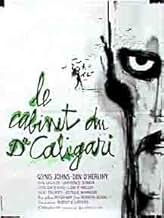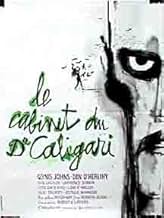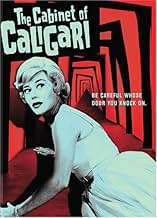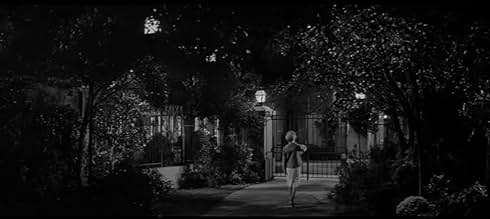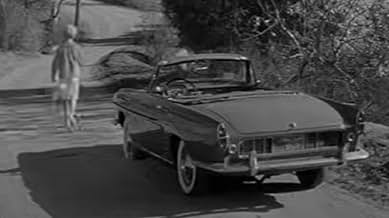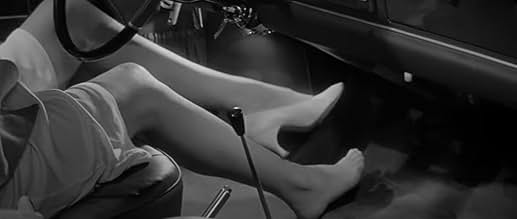CALIFICACIÓN DE IMDb
5.8/10
1.1 k
TU CALIFICACIÓN
Agrega una trama en tu idiomaA stranded young woman finds herself at a mysterious mansion where nothing is what it seems.A stranded young woman finds herself at a mysterious mansion where nothing is what it seems.A stranded young woman finds herself at a mysterious mansion where nothing is what it seems.
- Dirección
- Guionista
- Elenco
- Premios
- 1 premio ganado en total
Glynis Johns
- Jane
- (as Miss Glynis Johns)
Dan O'Herlihy
- Caligari
- (as Mr. Dan O'Herlihy)
- …
Richard Davalos
- Mark
- (as Dick Davalos)
- Dirección
- Guionista
- Todo el elenco y el equipo
- Producción, taquilla y más en IMDbPro
Opiniones destacadas
I was an impressionable 17-year-old back in 1962 when CALIGARI shocked the living daylights out of me. And to this day -- though, naturally, to a far lesser (suspenseful) degree (and despite some of its obvious flaws) -- I can still sit through a performance of this haunting film in nearly rapt attention.
The main reasons for this are twofold: (1) The ever present youth in me can be easily summoned, so that contextually I am back in the early '60s, eager to reimmerse myself in the intensity of the dark psychodrama about to be played out, and blithely unencumbered by the need for (or expectation of) today's technologically superior special effects; and (2) Gerald Fried's ubiquitous, compelling film score music (especially the bittersweet main theme, played repeatedly in a multitude of beguiling variations) adds an immeasurable degree of enjoyment to this sadly underrated film.
Fortunately, the commercial-free Fox Movie Channel has featured THE CABINET OF CALIGARI, which has been, for the most part, unavailable for purchase by the general public.
The main reasons for this are twofold: (1) The ever present youth in me can be easily summoned, so that contextually I am back in the early '60s, eager to reimmerse myself in the intensity of the dark psychodrama about to be played out, and blithely unencumbered by the need for (or expectation of) today's technologically superior special effects; and (2) Gerald Fried's ubiquitous, compelling film score music (especially the bittersweet main theme, played repeatedly in a multitude of beguiling variations) adds an immeasurable degree of enjoyment to this sadly underrated film.
Fortunately, the commercial-free Fox Movie Channel has featured THE CABINET OF CALIGARI, which has been, for the most part, unavailable for purchase by the general public.
There's one little moment that stood out for me when I watched this movie years ago on the USA network:
Glynis Johns spends most of the movie in some sort of conflict with Dan O'Herlihy playing Dr. Caligari...it's the sort of psych-out contest seen in every episode of The Prisoner and other war-of-wills dramas. Up to this point Ms. Johns is rather prim and after a while this can become irritating to viewers who are used to seeing female protagonists stand up for themselves more vigorously. After a frustrating argument with Dr. C, she runs upstairs, throws herself on the bed and (instead of sobbing or sulking, as her uptight character has behaved so far) lets out a huge WAAAAAA-HAAAAAAH! My girlfriend and I both collapsed with laughter ...but after that moment found ourselves much more in sympathy with her, and that is precisely the effect intended by Robert Bloch.
Overall the movie was worth the time it took to watch, but didn't stand out as a favorite for either of us. But when we encountered something frustrating after that, we'd look at each other and shout, "Waaaa-Hahhh!"
Glynis Johns spends most of the movie in some sort of conflict with Dan O'Herlihy playing Dr. Caligari...it's the sort of psych-out contest seen in every episode of The Prisoner and other war-of-wills dramas. Up to this point Ms. Johns is rather prim and after a while this can become irritating to viewers who are used to seeing female protagonists stand up for themselves more vigorously. After a frustrating argument with Dr. C, she runs upstairs, throws herself on the bed and (instead of sobbing or sulking, as her uptight character has behaved so far) lets out a huge WAAAAAA-HAAAAAAH! My girlfriend and I both collapsed with laughter ...but after that moment found ourselves much more in sympathy with her, and that is precisely the effect intended by Robert Bloch.
Overall the movie was worth the time it took to watch, but didn't stand out as a favorite for either of us. But when we encountered something frustrating after that, we'd look at each other and shout, "Waaaa-Hahhh!"
What was Robert Bloch thinking when he wrote this? As weird as the character's interactions are (no understandable motivations), the dialogue is full of dramatic clichés out of any context, like clips from a soap opera. Not a very thrilling blend for a horror movie. The original 1920 movie involved mesmerism and somnambulism: this film does both - it will hypnotise you into sleep immediately, even in the light of day. However, if you can stay awake, the story does have some dramatic impact, and the acting is fine throughout. The twist ending was done one better in a very similar 1950's EC comics (ie Tales from the Crypt) where the woman is cured but starts to have a relapse that cycles her back to the beginning of the story (a la "Dead of night").
Something just that little bit different here and something really rather good. The slightly odd or seeming unlikely happenings, including the casting of Glynis Johns all make sense by the end, at least as far as I am concerned. Great sets help create a 'modern' but nevertheless creepy feel and Gerald Fried's score is most effective. A very simple idea is admirably sustained and every now and then when we feel things cannot go on like this for much longer we are jolted, either by the outrageousness of Caligari or by the sudden appearance of another guest. I had never even heard of this film before the appearance of the DVD and wonder if indeed it ever opened in the UK. The sexual references and physical violence certainly surprised me for a film of the early 60's. Well worth seeing.
As was the case with many baby boomers, my first encounter with South African-born Glynis Johns, the daughter of renowned Welsh character actor Mervyn Johns, was via her short-lived American TV show, "Glynis." On this 1/2-hour sitcom, which only ran from September-December 1963 on CBS, Glynis played a character named Glynis Granville, a mystery writer who helped her husband solve crimes, and who was absolutely--to my young mind--delightful. A recent viewing of one of Glynis' later films, 1973's "Vault of Horror," served to remind me of just how charming she has always been, with her pretty blonde looks and inimitable husky voice. So it was with great eagerness that I even more recently popped one of her films that I'd never seen, "The Cabinet of Caligari," into the DVD player at home. Released in May 1962, five months before Glynis' 39th birthday, this "remake" of the classic German silent "The Cabinet of Dr. Caligari" (1919) jettisons most of the original's story line, salvaging only that famous twist ending. Scripted by Robert "Psycho" Bloch, the film introduces us to 27-year-old Jane Lindstrom (our Glynis), who seeks help at the ultramodern house of Dr. Caligari (Dan O'Herlihy) after her automobile suffers a blowout. The doctor is more than accommodating, but after she is unwittingly drugged, poor Jane realizes that she--and a good half dozen other residents under the doctor's roof--is a prisoner in this bizarre household, while Caligari's demands for highly personal information, as well as his peeping Tom proclivities, abuse of other "guests" and proffering of pornographic pictures, only add to Jane's distress....
Though lacking the surreal sets that made the original film an enduring and endearing classic of German Expressionism, the 1962 "Caligari" is still a fairly strange experience. Director Roger Kay utilizes interesting camera angles, freeze frames and occasionally non sequitur dialogue to engender an atmosphere of the macabre. Kay makes excellent use of space in his CinemaScope frame, and yes, DOES throw in some decidedly Expressionistic FX toward the film's conclusion. (I should perhaps add here that those viewers who choose to watch this DVD utilizing the "full-screen" option, rather than the "wide-screen," will be lacking almost 50% of the image, and will certainly be missing most of the picture's impact.) The director is ably abetted by the excellent camera work of John L. Russell, who had lensed "Psycho" for Hitchcock two years earlier (Jane Lindstrom, it might be added, has a bathtub experience in the film that is not QUITE as harrowing as Marion Crane's!), as well as by the lovely and memorable score provided here by Gerald Fried. But surely, this picture belongs to Glynis Johns, who perforce appears in every single scene in it. She is simply superb here, running the gamut from sweet to scared, haggard to Marilyn Monroe-type sexpot, suicidal and submissive to zesty and domineering; practically an Oscar-worthy performance! (And while I'm on the subject, hey, Academy: Glynis is 88 as of this writing. Howzabout an honorary Oscar for this wonderfully unique performer while she's still with us?) Perfectly cast here, she brings a combination of steely outrage and befuddled defenselessness to her role that is quite wonderful to behold, and makes the film--essentially a 100-minute-long red herring--a genuine must-see, and one that can stand independently of its famous forebear....
Though lacking the surreal sets that made the original film an enduring and endearing classic of German Expressionism, the 1962 "Caligari" is still a fairly strange experience. Director Roger Kay utilizes interesting camera angles, freeze frames and occasionally non sequitur dialogue to engender an atmosphere of the macabre. Kay makes excellent use of space in his CinemaScope frame, and yes, DOES throw in some decidedly Expressionistic FX toward the film's conclusion. (I should perhaps add here that those viewers who choose to watch this DVD utilizing the "full-screen" option, rather than the "wide-screen," will be lacking almost 50% of the image, and will certainly be missing most of the picture's impact.) The director is ably abetted by the excellent camera work of John L. Russell, who had lensed "Psycho" for Hitchcock two years earlier (Jane Lindstrom, it might be added, has a bathtub experience in the film that is not QUITE as harrowing as Marion Crane's!), as well as by the lovely and memorable score provided here by Gerald Fried. But surely, this picture belongs to Glynis Johns, who perforce appears in every single scene in it. She is simply superb here, running the gamut from sweet to scared, haggard to Marilyn Monroe-type sexpot, suicidal and submissive to zesty and domineering; practically an Oscar-worthy performance! (And while I'm on the subject, hey, Academy: Glynis is 88 as of this writing. Howzabout an honorary Oscar for this wonderfully unique performer while she's still with us?) Perfectly cast here, she brings a combination of steely outrage and befuddled defenselessness to her role that is quite wonderful to behold, and makes the film--essentially a 100-minute-long red herring--a genuine must-see, and one that can stand independently of its famous forebear....
¿Sabías que…?
- TriviaAlthough several horror/suspense movies (most notably Psycho) were advertised with the warning that patrons would not be seated after film began or during climactic final minutes, ads for this one included the unenforceable caveat that no one would be allowed to leave the theater during the last 13 minutes.
- ErroresAs Jane sits at the dinner table having a private discussion with Paul, the bowl of lobster bisque she refuses to eat disappears between shots.
- Citas
Caligari: How old were you when you first let a man make love to you? Next, who was he? Next, how did you feel at the time? Next, how did you feel afterwards? What did you feel? What did you think? Were you pleased, frightened, ecstatic, disgusted? What did he say? What words did you speak? That's what I want to know. Now. Tell me. Now. Now. All of it, now. Tell me. YES!
- ConexionesFeatured in Aweful Movies with Deadly Earnest: The Cabinet of Caligari (1973)
Selecciones populares
Inicia sesión para calificar y agrega a la lista de videos para obtener recomendaciones personalizadas
- How long is The Cabinet of Caligari?Con tecnología de Alexa
Detalles
- Tiempo de ejecución1 hora 46 minutos
- Color
- Relación de aspecto
- 2.35 : 1
Contribuir a esta página
Sugiere una edición o agrega el contenido que falta

Principales brechas de datos
By what name was El gabinete del Dr. Caligari (1962) officially released in India in English?
Responda
